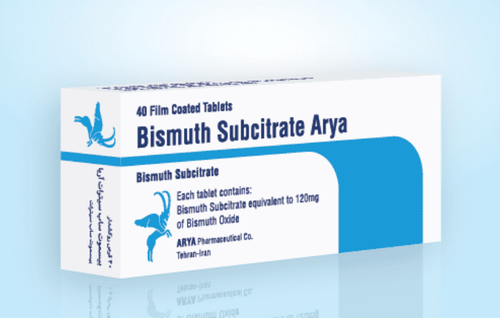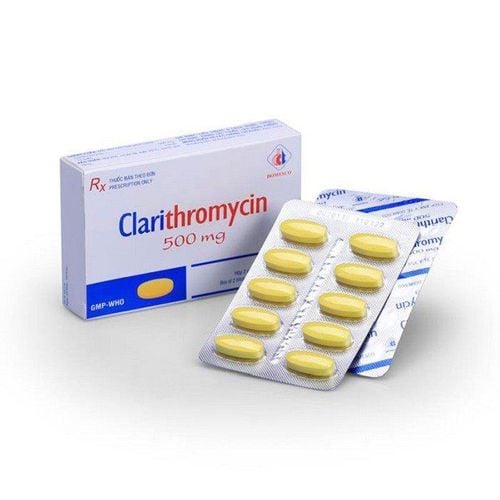This is an automatically translated article.
Klacid 250mg contains the main active ingredient is clarithromycin, an antibiotic of the Macrolide group. The drug can be used in the treatment of respiratory infections, soft tissue skin infections or in combination in the treatment regimen for Hp.
1. What is Klacid 250mg?
Klacid 250mg contains the main active ingredient is clarithromycin with a strength of 250mg. Clarithromycin is an antibiotic belonging to the macrolide group. The antibacterial action relies on binding to the 50S ribosomal subunit leading to inhibition of bacterial protein synthesis. The spectrum of action of clarithromycin is broad, highly effective against gram-positive and gram-negative, aerobic and anaerobic bacteria such as Streptococcus pyogenes, Staphylococcus aureus, Streptococcus pneumoniae, Helicobacter pylori,... In addition, clarithromycin is also effective. on some intracellular bacteria.
Clarithromycin is well absorbed from the gastrointestinal tract. The bioavailability of clarithromycin is about 55%. Food in the stomach does not affect the bioavailability of the drug. Clarithromycin is extensively metabolised in the liver and excreted in the bile, to a lesser extent in the urine.
2. The therapeutic use of Klacid 250
Klacid 250mg is indicated for use in the following cases:
Respiratory tract infections such as: otitis media, tonsillitis, acute sinusitis, chronic bronchitis with exacerbations, pneumonia caused by some bacteria M.pneumoniae, Legionella,... The drug can also be indicated in the treatment of skin and soft tissue infections, opportunistic infections caused by Mycobacterium, or in combination to eradicate Helicobacter pylori in peptic ulcers.
3. Side effects of the drug Klacid 250mg
Klacid 250mg medicine can cause some side effects as follows:
1 to 10%:
Central nervous system: Headache, dizziness, fatigue, insomnia Dermatology: Skin rash Digestive: Disorders Gastrointestinal , nausea, vomiting, abdominal pain, diarrhea, dyspepsia Hematology: Risk of prolongation of prothrombin time Liver: Abnormal liver function tests Hypersensitivity: Anaphylactic reaction Infection: Fungal infection Candida Kidney: Hypernitremia <1%: abdominal distention, abnormal albumin-globulin ratio, acne, agranulocytosis, altered sense of smell, anaphylaxis, angioedema, anorexia, anemia, anxiety, asthma, atrial fibrillation, behavior changes, bullous dermatitis, cellulitis, chest pain, chills, cholestatic hepatitis, Clostridium difficile diarrhea (pseudomembranous colitis), confusion , constipation, dark urine, drowsiness, eosinophilia, epistaxis, fatigue, fever, flatulence, gastritis, gastroenteritis, QT prolongation on electrocardiogram, torsades de pointes , ventricular arrhythmias, ventricular tachycardia, dizziness, weakness, confusion heartbeat .
4. How to take Klacid 250mg
Klacid 250mg is taken orally. The specific dosage is as follows:
Adults and children over 12 years old: The usual dose is 250 mg x 2 times / day for 7 days. In severe infections, it may be increased to 500 mg twice daily. Patients with renal impairment: No dose adjustment is usually required unless the patient has severe renal impairment (creatinine clearance less than 30 ml/min). If dose adjustment is required, the daily dose should be halved. Children: It is recommended to use liquid medicine, eg Klacid 250mg/5ml powder for oral suspension. The daily dose for children is 7.5 mg/kg (maximum 500 mg/time), orally twice daily. Treatment time is usually 7-10 days depending on the condition of the disease.
5. Note when using Klacid 250mg
Clarithromycin is contraindicated in patients with a history of hypersensitivity to macrolide antibiotics. The use of clarithromycin with terfenadine is absolutely contraindicated, because of the risk of QT prolongation and possibly death (especially in patients with a history of cardiovascular disease such as arrhythmias, bradycardia, prolonged QT interval). , myocardial ischemia or electrolyte disturbances ).Use has been associated with QT prolongation and cases of cardiac arrhythmias, including torsades de pointes (possibly fatal). Avoid use in patients with QT prolongation, ventricular arrhythmias (including torsades de pointes), clinically significant bradycardia, and patients receiving class IA (eg, quinidine, procainamide) or class III therapy. (eg, amiodarone, dofetilide, sotalol) or other drugs known to prolong the QT interval.
Effects on the liver: Altered liver function tests and hepatitis have been reported. However, these effects are usually reversible upon discontinuation of clarithromycin. May lead to liver failure or death (rarely), especially in the presence of pre-existing conditions. Discontinue immediately if symptoms of hepatitis occur (eg, loss of appetite, jaundice, abdominal pain, itching, dark urine). Hypersensitivity Reactions: Serious acute reactions have been reported with the use of clarithromycin, including anaphylaxis, toxic epidermal necrolysis (TEN), Stevens-Johnson syndrome (SJS), drug rash, and anaphylaxis. with eosinophilia and systemic symptoms (DRESS). When signs of hypersensitivity occur, patients need to stop treatment and immediately go to medical facilities for timely treatment. Superinfection: Use of the drug can lead to fungal or bacterial superinfection, including pseudomembranous colitis and C. difficile diarrhea. Patients with myasthenia gravis: Klacid should be used with caution in patients with myasthenia gravis. Renal Impairment: Use with caution in patients with severe renal impairment, the dosage should be adjusted when necessary. Elderly: Use with caution, as elderly patients may be at increased risk of torsades de pointes. Pregnancy: Clarithromycin crosses the placenta. The manufacturer recommends that clarithromycin not be given to pregnant women, unless there is no alternative therapy. Clarithromycin is not recommended as a first-line agent for the treatment or prophylaxis of Mycobacterium avium in HIV-infected pregnant patients. Lactation: Clarithromycin and its active metabolite are present in breast milk. Symptoms of decreased appetite, diarrhea, rash and somnolence have been reported in breastfed infants exposed to macrolide antibiotics. In general, antibiotics found in breast milk can cause changes to the gut microbiota. According to the manufacturer, the decision to breastfeed during treatment should consider the risk of drug exposure to the infant, the benefits of treatment to the mother, and the benefits of breastfeeding. Drug interactions: Clarithromycin has the ability to inhibit the cytochrome P450 system - an enzyme system that plays a role in metabolizing many drugs. Therefore, interactions may occur when clarithromycin is used concomitantly with drugs metabolised by cytochrome P450. Therefore, patients need to inform their doctor about all drugs and supplements they are using for appropriate advice and adjustment.
In summary, Klacid is an antibiotic that is often indicated in respiratory infections, soft tissue skin infections or in combination in Hp treatment regimens. The drug can cause many side effects and the risk of serious drug interactions (QT prolongation, torsades de pointes). Therefore, patients need to strictly adhere to the indications and recommended dosages.
Follow Vinmec International General Hospital website to get more health, nutrition and beauty information to protect the health of yourself and your loved ones in your family.
Please dial HOTLINE for more information or register for an appointment HERE. Download MyVinmec app to make appointments faster and to manage your bookings easily.













